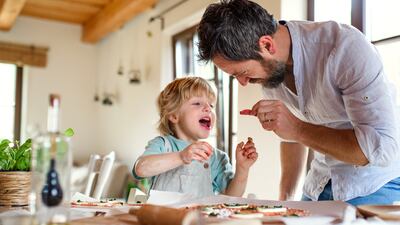I became a parent and a partner at work at the beginning of a global pandemic. These three Ps converged to produce the perfect storm. And in the eye of that storm, my wife and I chose to raise our son as true 50/50 co-parents. I’m a "working dad", which has led to beautiful, comedic and dramatic consequences.
If my CV read transparently, it would state I’m a professional pyjama wearer. I’m an expert in Peppa Pig and know the lyrics to 80 per cent of all CoComelon songs. I can change a nappy lying down or standing up. I have rolled more Play-Doh balls than grains of sand in the Arabian Desert. I can smell a wet nappy like a dog sniffs out truffles, and I can feign excitement like Tom Cruise in an Oprah interview. More transferable, I have the patience of a saint and have learnt to multitask. I can take conference calls while playing peekaboo (thanks to the mute button – the greatest invention for working-from-home parents).
My day starts with the words "let’s go" every morning, even before my brain has registered conscious thought, as my son snuggles up to me (having already learnt at 2 that no one disturbs mummy at the break of dawn), and coerces me to get up and start the day. I walk like an old-age pensioner to the living room (I suffer from Achilles tendinitis owing to the 12-kilogram koala bear I have attached to me throughout the day).
Before work begins, we have chopped tomatoes with a blunt knife, played several rounds of hide and seek, destroyed the playroom and living room, and watched 10 episodes of Masha and the Bear.
The beauty of Dubai and where we live gives us the opportunity to spend most mornings in a swimming pool. My son has been able to swim from the age of 1. When I say swim, it is purely underwater, like a water baby from Walt Disney’s Silly Symphonies. He is two-and-a-half now and although not an Olympic swimmer yet, who knows what the future might hold?
To digress a bit, I’m not sure if this is a dad thing, but I constantly imagine my son as a professional athlete and think of ways to start the programme now – nutrition, and building kinaesthetic awareness and the right mindset. I don’t force, I encourage, but every strike of the ball or deft display of dexterity fuels an inner dream.
The rest of the day is a combination of pure joy, moments of peace (hurrah for afternoon naps) and survival mode, where my wife and I try to parent, keep the apartment in order and work. We have not quite found a nursery that appeals to us yet (a story for another time), we do not have our own parents in-country, and we’re cautious of how much time our son spends with a babysitter.
Beyond the innate love of your child, parenting is a job. It is the hardest job I have ever taken on. It is also the most rewarding. There is satisfaction in successfully managing what feels like an hourly mini-crisis, whether that be refusing to eat anything, wanting to only wear blue or attacking the kitchen like a jailbreak on Black Friday.
Unfortunately, however, it does not pay the bills (what a great concept that would be – a nationwide financial bonus scheme on how well you parent your children). And so we find ourselves stumbling through professional and personal worlds, formal boundaries smashed apart by progeny and pandemic alike.
Having a child is the most wonderful privilege (the opening gambit used by all parents to precede an explanation of our loss of sanity). And yet, there is no truer dichotomy. Nothing prepares you for being a parent and there is, in my experience, no greater challenge. And yet I would do it again a million times over (not have a million children, of course), just to partake in the greatest blind date of all time.
Co-parenting may not be for everyone, but it has been the best choice of my life. Why? Watch this space.
Tristan Hills-Bos is the former head of Brunswick Arts, Gulf, and has helped to launch some of the region’s most significant cultural institutions, including Louvre Abu Dhabi, Qasr Al Hosn and the Royal Opera House Muscat. He continues to help governments and foundations build communities through large-scale cultural projects, and sits on the board of the Jean Paul Najar Foundation. He will write a weekly series of three columns on his decision to co-parent

